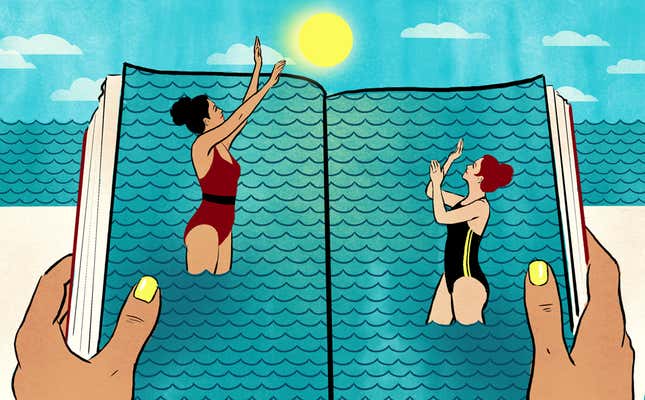A Haphazard Summer Reading List For All of Your Summer Moods
Latest

Sup? You looking for something to read while basking in/avoiding the sun? Well, step right this way. Here’s a list of summer book recommendations from Jezebel staff, arranged by summer moods.
DYSTOPIAN VIBES
Station Eleven, Emily St. John Mandel: I’m in the middle of this book and it is terrific. Station Eleven follows a traveling group of actors in musicians who roam a post-apocalyptic landscape going from one bombed-out IHOP with families living in it to a gas station run by a cult, just to preform Shakespeare. Their motto: survival is insufficient. —Natasha Vargas-Cooper
The Southern Reach Trilogy, Jeff VanderMeer: Yeah, yeah, yeah, I’m the umpteen millionth person to recommend this surreal series about a mysterious Florida nexus of ecological catastrophe and the hair-raising unreal. But it’s hard to imagine something more perfect for, say, the deadness of the second week of August. —Kelly Faircloth
Man V. Nature, Diane Cook: Beautifully written dystopian short story collection. —Jane Marie
THINK OF THE CHILDREN
After Birth, Elisa Albert: For Ferrante fans, women concerned about the next decade of their life being defined by fertility, and anyone interested in how a woman’s initial concern and love for the state of womanhood can turn into deafening hate. The narrator is the best bitter narrator I’ve read in some time. —Jia Tolentino
Love Me Back, Merritt Tierce: The narrator is a high-end steakhouse waitress in Dallas and the opening scene is a coked-up threesome with two expense-account customers. The narrator, interestingly enough, is also a mother. The writing glitters, bleeds, cuts. —Jia Tolentino
The Children Act, Ian McEwan: McEwan’s novels are often about one idea, a thought experiment that his characters playing it out. In the Children Act, it’s a child welfare judge who is supposed to make decisions for broken families. In a sense, this makes the judge a de facto mother and when the state acts as mother, results are mixed. —Natasha Vargas-Cooper
HEAVY DUTY
Down and Delirious in Mexico City, Daniel Hernandez: I suppose I don’t go in too much for fiction, but journalist Daniel Hernandez’s essays about moving from California to Distrito Federal in his parents’ birth country are as vivid and glorious as if he crafted them from his mind. Spanning the emo riots to the gay fashion scene to holes-in-the-wall bars to the cult of Santa Muerte, Hernandez gives you the real deal on the niches and subcultures of a city that’s almost always mischaracterized by the US media. —Julianne Escobedo Shepherd
How to Slowly Kill Yourself and Others in America, Kiese Laymon: To quote Julie Ruin, It’s gonna be a hot, hot summer in hell, businessman. We’re starting June in the magma pits of a cracked universe, seething racial inequality manifesting in mass murder. Laymon, a brilliant essayist (and Gawker contributor) who grew up in Mississippi, reflects on the way this flawed country shaped him with the kind of incisive intellect and scrutiny that helps center what’s virulently wrong, and how to cope. Not an easy read because Laymon is real as hell, but you’ll want to hold on to each essay and squeeze tight. —Julianne Escobedo Shepherd
-

-

-

-

-

-

-

-

-

-

-

-

-

-

-

-

-

-

-

-

-

-

-

-

-

-

-

-

-

-

-

-

-

-

-

-

-

-

-

-








































